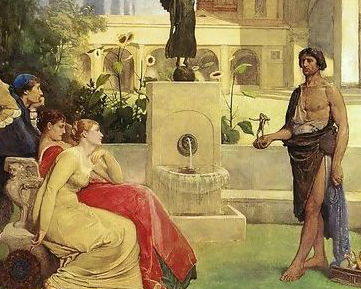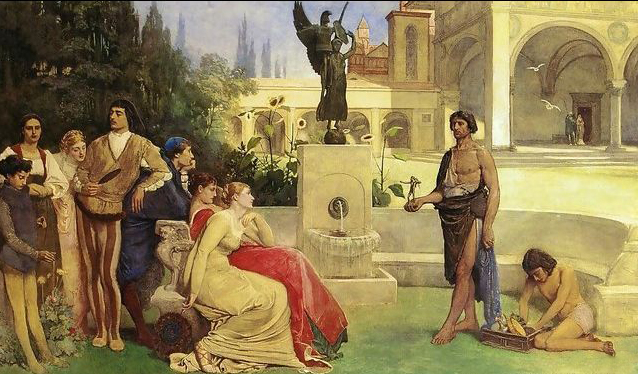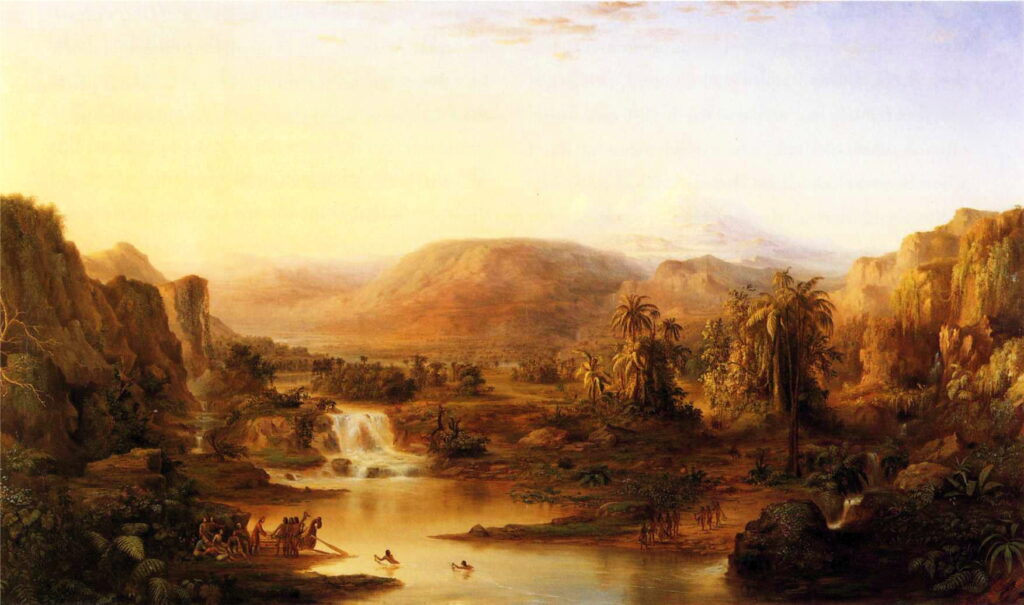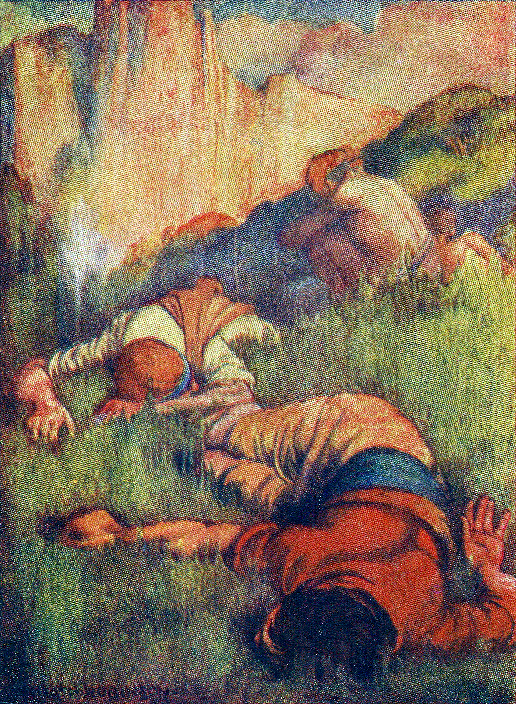2020.10.09 | By Gregory Nagy
§0. As I was reading through the first volume of Rick Riordan’s five-volume series, Percy Jackson and the Olympians, Lightning Thief (2005), the story that is told there about a visit to “Lotus Hotel” by Percy and his companions Annabeth and Grover (pages 257–265) made me think of the passage in the Homeric Odyssey, Rhapsody 9 verses 82–104, where Odysseus and his companions visit the Land of the Lotus-Eaters. I am sure that countless readers before me have thought what I am thinking about the story told by Rick. What we see here is a deft retelling of the story of Odysseus and the Lotus-Eaters. In both versions of the story, let’s call them Homer’s version and Rick’s version, there is a pleasurable forgetting of the present, and this forgetfulness leads to the danger of eternally postponing the future. But I have something to add here about this Odyssean story, viewed through a Homeric lens. That something is a detail in Rick’s retelling that made me rethink the original passage in the Odyssey. What caught my eye in Rick’s version of the story was his perceptive highlighting of visual pleasures— like the sweet delights of video-games. I see a comparable highlighting in the picture that I show here as the main illustration for my essay. In this picture, we see an art-seller who is selling the beauty of his art to beautiful people who are forgetting about their own beauty. As we will see, such forgetfulness is at the core of the Homeric story about Odysseus and the Lotus-Eaters.


§1. In the Homeric story, however, there is another kind of sensory pleasure that dominates. It is not the pleasure of seeing something that enchants, as highlighted in Rick’s playful references to video games—and even in the painting about the art-seller. No, this time it is the pleasure of tasting, brought to life in the sweetness of the forbidden fruit produced by the Lotus. I quote here the Greek text, verses 82–104 of Rhapsody 9 in the Homeric Odyssey, followed by my working translation:
ἔνθεν δ’ ἐννῆμαρ φερόμην ὀλοοῖσ’ ἀνέμοισι
πόντον ἐπ’ ἰχθυόεντα· ἀτὰρ δεκάτῃ ἐπέβημεν
γαίης Λωτοφάγων, οἵ τ’ ἄνθινον εἶδαρ ἔδουσιν.
9.85 ἔνθα δ’ ἐπ’ ἠπείρου βῆμεν καὶ ἀφυσσάμεθ’ ὕδωρ,
αἶψα δὲ δεῖπνον ἕλοντο θοῇς παρὰ νηυσὶν ἑταῖροι.
αὐτὰρ ἐπεὶ σίτοιό τ’ ἐπασσάμεθ’ ἠδὲ ποτῆτος,
δὴ τότ’ ἐγὼν ἑτάρους προΐην πεύθεσθαι ἰόντας,
οἵ τινες ἀνέρες εἶεν ἐπὶ χθονὶ σῖτον ἔδοντες,
9.90 ἄνδρε δύω κρίνας, τρίτατον κήρυχ’ ἅμ’ ὀπάσσας.
οἱ δ’ αἶψ’ οἰχόμενοι μίγεν ἀνδράσι Λωτοφάγοισιν·
οὐδ’ ἄρα Λωτοφάγοι μήδονθ’ ἑτάροισιν ὄλεθρον
ἡμετέροισ’, ἀλλά σφι δόσαν λωτοῖο πάσασθαι.
τῶν δ’ ὅς τις λωτοῖο φάγοι μελιηδέα καρπόν,
9.95 οὐκέτ’ ἀπαγγεῖλαι πάλιν ἤθελεν οὐδὲ νέεσθαι,
ἀλλ’ αὐτοῦ βούλοντο μετ’ ἀνδράσι Λωτοφάγοισι
λωτὸν ἐρεπτόμενοι μενέμεν νόστου τε λαθέσθαι.
τοὺς μὲν ἐγὼν ἐπὶ νῆας ἄγον κλαίοντας ἀνάγκῃ,
νηυσὶ δ’ ἐνὶ γλαφυρῇσιν ὑπὸ ζυγὰ δῆσα ἐρύσσας·
9.100 αὐτὰρ τοὺς ἄλλους κελόμην ἐρίηρας ἑταίρους
σπερχομένους νηῶν ἐπιβαινέμεν ὠκειάων,
μή πώς τις λωτοῖο φαγὼν νόστοιο λάθηται.
οἱ δ’ αἶψ’ εἴσβαινον καὶ ἐπὶ κληῖσι καθῖζον,
ἑξῆς δ’ ἑζόμενοι πολιὴν ἅλα τύπτον ἐρετμοῖς.
[The sea voyage of Odysseus has just run into big trouble when his ship is blown off-course.]
82 [Now that I was blown off course], from that point on, I was for nine
days swept along by deadly winds
83 over the fish-swarming sea. Then, on the tenth day, we came upon
84 the land of the Lotus-Eaters, the ones who feed on a flowery plant for
food.
85 There we landed and got a supply of water.
86 Right away, a meal was made ready, next to the beached ships, by
my companions,
87 and after they had consumed their share of food and drink
88 I sent off some of my companions on an errand to go and find out
89 what kinds of men were in this land who were eating the food they
ate.
90 I chose two men [for the errand], and I added a third one, a herald, to
go along with them.
91 No sooner had they gone off when they met up with the lotus-eating
men.
92 Now the Lotus-Eaters, you know, really had no plans to cause any
destruction for these companions
93 of mine. But they did give to them [= my companions] some Lotus,
sharing it with them for eating,
94 and not one of them [= my companions], once they tasted the lotus,
eating the honey-sweet fruit,
95 was any longer able to report-back [to us], or even to come-back
[neesthai] at all.
96 Instead, they just wanted to be right where they were, in the company
of the lotus-eating men,
97 and, as for the lotus, to keep on munching on it, staying there, and to
neglect-to-keep-in-mind-the-thought [lēth-] of coming-back-home
[nostos].
98 But I made them go back to the ships. They were crying, but I made
them go back anyway, using force.
99 And, once I dragged them back inside the hollows of the ships, I tied
them to the benches.
100 As for the rest of them, I told them, true companions that they were,
101 to hurry up and board the swift ships,
102 just to make sure that not a single one of them should try to taste the
lotus and thus neglect-to-keep-in-mind-the-thought [lēth-] of coming-
back-home [nostos].
103 So they all boarded, right away, and took their seats,
104 all lined up in a row, and they were pounding at the gray sea with
their oars as they rowed onward.
§2. I think I now understand, with the help of Rick’s retelling, that the power of the lotus here is in its sweetness. The lotus is so pleasurably sweet, so sweetly pleasurable, that you cannot think of anything in the future that could ever possibly rival the sweetest pleasure that you are tasting right now, in the present. The pleasure of a future ‘homecoming’, nostos, which is a coming back to home sweet home, is thus deferred forever, because the immediate pleasure seems far superior, even supreme. So the pleasure gives a false sense of homecoming, because your mind has come home to a false home.
§3. We see something comparable in the picture that I chose as the illustration for my essay: as I already noted, we see here an art-seller who is showing off the beauty of the art he is selling, while those who gaze at the art are mesmerized by its beauty, losing sight of the beauty in their own surroundings. They even lose sight of their own beauty. It is a mental lapse of letting your mind let go of the beauty that can be seen right there in real life, in your own life, in the life that you are living.
§4. Such a mental lapse, conveyed in the Odyssey by way of the word lēth-, deprives you of the ability to make mental connections, conveyed in the Odyssey by way of the word noos, which can be translated as ‘mind’ or even ‘consciousness’.
§5. Remarkably, this word noos in the sense of ‘consciousness’ is related to the word nostos, which as we have seen means ‘homecoming’, that is, a coming-back-home to home-sweet-home. I epitomize here my relevant remarks in The Ancient Greek Hero in 24 Hours (Nagy 2013), “Hour” 10 §9:
The relationship between noos ‘consciousness, mind’ and nostos ‘homecoming, return’ is encoded in the telling of the myth about the Land of the Lotus-Eaters in Odyssey 9.82–104. When Odysseus visits that land, those of his comrades who taste the sweetness of the lotus lose their consciousness of home and therefore cannot return home. The verb lēth‑, ‘forget’, combined with nostos, ‘return’, as its object, conveys the idea of such unconsciousness (9.97, 102). By contrast, the noun noos, ‘thinking’, conveys the idea of being conscious of nostos. So, here is the basic teaching to be learned from the myth about the Land of the Lotus-Eaters: if you lose the “implant” of homecoming in your mind, you cannot go home because you no longer know what home is.


Bibliography
Nagy, G. 2013. The Ancient Greek Hero in 24 Hours. Cambridge, MA. http://nrs.harvard.edu/urn-3:hul.ebook:CHS_NagyG.The_Ancient_Greek_Hero_in_24_Hours.2013.
